- Home
- Holly Black
Bad Seeds: Evil Progeny Page 19
Bad Seeds: Evil Progeny Read online
Page 19
“And they lived happily ever after among the fairies,” the girl at the top of the well says. “The end.”
Today’s performance ends.
“Wait,” I’ll say, a little weaker each time, but she doesn’t reply. She never replies. She only pulls away, leaving me for another night and another day with nothing for company but these rotten wooden block bones, plus two sets of human ones.
Cockroach
Dale Bailey
After the examination, they gathered in the office of the physician, an obstetrician named Exavious that a friend of Sara’s had recommended. Dr. Exavious specialized in what Sara termed “high-risk pregnancies,” which Gerald Hartshorn took to mean that his wife, at thirty-seven, was too old to be having babies. Secretly, Gerald thought of his wife’s … condition … not as a natural biological process, but as a disease: as fearsome and intractable, and perhaps—though he didn’t wish to think of it—as fatal.
During the last weeks, a seed of fear Gerald had buried almost ten years ago—buried and forgotten, he had believed—had at last begun to germinate, to spread hungry tendrils in the rich loam of his heart, to feed.
And now, such thoughts so preoccupied him that Gerald only half-listened as Dr. Exavious reassured Sara. “We have made great strides in bringing to term women of your age,” he was saying, “especially women in such superb condition as I have found you to be … ”
These words, spoken in the obscurely accented English which communicated an aura of medical expertise to men of Gerald’s class (white, affluent, conservative, and, above all, coddled by a network of expensive specialists)—these words should have comforted him.
They did not. Specialist or not, the fact remained that Gerald didn’t like Exavious, slim and Arabic, with febrile eyes and a mustache like a narrow charcoal slash in his hazel flesh. In fact, Gerald didn’t like much of anything about this … situation. Most of all, he didn’t like being left alone with the doctor when Sara excused herself at the end of the meeting. He laced his fingers in his lap and gazed off into a corner, uncertain how to proceed.
“These times can be difficult for a woman,” Exavious said. “There are many pressures, you understand, not least on the kidneys.”
Gerald allowed himself a polite smile: recognition of the intended humor, nothing more. He studied the office—immaculate carpet, desk of dark expensive wood, diplomas mounted neatly on one wall—but saw no clock. Beyond tinted windows, the parking lot shimmered with mid-summer heat. Julian would be nuts at the office. But he didn’t see how he could steal a glance at his watch without being rude.
Exavious leaned forward and said, “So you are to be a father. You must be very happy, Mr. Hartshorn.”
Gerald folded and unfolded his arms. “Oh … I guess. Sure.”
“If you have further questions, questions I haven’t answered, I’d be happy to … ” He let the rest of the sentence hang, unspoken, in the air. “I know this can be a trying experience for some men.”
“I’m just a bit nervous, that’s all.”
“Ah. And why is that?”
“Well, her history, you know.”
Exavious smiled. He waved a hand dismissively. “Such incidents are not uncommon, Mr. Hartshorn, as I’m sure you know. Your wife is quite healthy. Physiologically, she is twenty-five. You have nothing to fear.”
Exavious sighed; he toyed with a lucite pyramid in which a vaguely alien-looking model of a fetus had been embedded. The name of a drug company had been imprinted in black around its base. “There is one thing, however.”
Gerald swallowed. A slight pressure constricted his lungs. “What’s that?”
“Your wife has her own fears and anxieties because of the history you mentioned. She indicated these during the examination—that’s why she came to me in the first place. Emotional states can have unforeseen physiological effects. They can heighten the difficulty of a pregnancy. Most doctors don’t like to admit it, but the fact is we understand very little about the mind-body relationship. However, one thing is clear: your wife’s emotional condition is every bit as important as her physical state.” Exavious paused. Some vagary of the air-conditioning swirled to Gerald’s nostrils a hint of his after-shave lotion.
“I guess I don’t really understand,” Gerald said.
“I’m just trying to emphasize that your wife will need your support, Mr. Hartshorn. That’s all.”
“Are you suggesting that I wouldn’t be supportive?”
“Of course not. I merely noticed that—”
“I don’t know what you noticed, but it sounds to me—”
“Mr. Hartshorn, please.”
“—like you think I’m going to make things difficult for her. You bet I’m nervous. Anyone in my circumstances would be. But that doesn’t mean I won’t be supportive.” In the midst of this speech, Gerald found himself on his feet, a hot blush rising under his collar. “I don’t know what you’re suggesting—” he continued, and then, when Exavious winced and lifted his hands palms outward, he consciously lowered his voice. “I don’t know what you’re suggesting—”
“Mr. Hartshorn, please. My intent was not to offend. I understand that you are fearful for your wife. I am simply trying to tell you that she must not be allowed to perceive that you too are afraid.”
Gerald drew in a long breath. He sat, feeling sheepish. “I’m sorry, it’s … I’ve been under a lot of pressure at work lately. I don’t know what came over me.”
Exavious inclined his head. “Mr. Hartshorn, I know you are busy. But might I ask you a small favor—for your sake and for your wife’s?”
“Sure, please.”
“Just this: take some time, Mr. Hartshorn, take some time and think. Are you fearful for your wife’s welfare, or are you fearful for your own?”
Just then, before Gerald could reply, the door from the corridor opened and Sara came in, her long body as yet unblemished by the child within. She brushed back a wisp of blonde hair as Gerald turned to face her. “Gerald, are you okay? I thought I heard your—”
“Please, Mrs. Hartshorn, there was nothing,” the doctor said warmly. “Is that not correct, Mr. Hartshorn? Nothing, nothing at all.”
And somehow Gerald recovered himself enough to accede to this simple deception as the doctor ushered them into the corridor. Outside, while Sara spoke with the receptionist, he turned at a feathery touch on his shoulder. Dr. Exavious enveloped his hand and gazed into his eyes for a long and obscurely terrible moment; and then Gerald wrenched himself away, feeling naked and exposed, as if those febrile eyes had illuminated the hollows of his soul, as if he too had been subjected to an examination and had been found wanting.
“I don’t know,” Gerald said as he guided the Lexus out of the clinic lot. “I don’t like him much. I liked Schwartz better.”
He glanced over at Sara, her long hand curved beneath her chin, but she wouldn’t meet his eyes.
Rush hour traffic thickened around them. He should call Julian; there wasn’t much point in trying to make it back to the office now. He had started to reach for the phone when Sara said, “He’s a specialist.”
“You heard him: you’re in great shape. You don’t need a specialist.”
“I’d feel more comfortable with him.”
Gerald shrugged. “I just didn’t think he was very personable, that’s all.”
“Since when do we choose our doctors because they’re personable, Gerald?” She drummed her fingers against the dash. “Besides, Schwartz wasn’t especially charming.” She paused; then, with a chill hint of emotion, she added, “Not to mention competent.”
Like stepping suddenly into icy water, this—was it grief, after all these years? Or was it anger?
He extended a hand to her, saying, “Now come on, Sara—”
“Drop it, Gerald.”
“Fine.”
An oppressive silence filled the car. No noise from without penetrated the interior, and the concentrated purr of the engine was so muted
that it seemed rather a negation of sound. A disquieting notion possessed him: perhaps there never had been sound in the world.
A fractured series of images pierced him: rain-slicked barren trees, black trunks whipped to frenzy by a voiceless wind; lane upon lane of stalled, silent cars, pouring fumes into the leaden sky; and Sara—Sara, her lips moving like the lips of a silent movie heroine, shaping words that could not reach him through the changeless air.
Gerald shook his head.
“Are you ready to go home or do you need to stop by the library?” he asked.
“Home. We need to talk about the library.”
“Oh?”
“I’m thinking of quitting,” she said.
“Quitting?”
“I need some time, Gerald. We have to be careful. I don’t want to lose this baby.”
“Well, sure,” he said. “But quitting.”
Sara swallowed. “Besides, I think the baby should be raised at home, don’t you?”
Gerald slowed for a two-way stop, glanced into the intersection, and plunged recklessly into traffic, slotting the Lexus into a narrow space before a looming brown UPS truck. Sara uttered a brief, piercing shriek.
“I hadn’t really thought about it,” Gerald said.
And in fact he hadn’t—hadn’t thought about that, or dirty diapers, or pediatricians, or car seats, or teething, or a thousand other things, all of which now pressed in upon him in an insensate rush. For the first time he thought of the baby not as a spectral possibility, but as an imminent presence, palpable, new, central to their lives. He was too old for this.
But all he said was: “Quitting seems a little drastic. After all, it’s only part-time.”
Sara didn’t answer.
“Why don’t we think about it?”
“Too late,” Sara said quietly.
“You quit?”
Gerald glanced over at her, saw a wry smile touch her lips, saw in her eyes that she didn’t really think it funny.
“You quit?”
“Oh, Gerald,” she said. “I’m sorry, I really am.”
But he didn’t know why she was apologizing, and he had a feeling that she didn’t know why either. He reached out and touched her hand, and then they were at a stoplight. Gerald reached for the phone. “I’ve got to call Julian,” he said.
The instrument of Gerald Hartshorn’s ascension at the advertising firm of MacGregor, MacGregor, & Turn had been a six-foot-tall cockroach named Fenton, whom Gerald had caused to be variously flayed, decapitated, delimbed, and otherwise dispatched in a series of t.v. spots for a local exterminator who thereafter had surpassed even his nationally advertised competitors in a tight market. Now, a decade later, Gerald could recall with absolute clarity the moment of this singular inspiration: an early morning trip to the kitchen to get Sara a glass of grapefruit juice.
That had been shortly after Sara’s first pregnancy, the abrupt, unforgettable miscarriage that for months afterwards had haunted her dreams. Waking in moans or screams or a cold accusatory silence that for Gerald had been unutterably more terrible, she would weep inconsolably as he tried to comfort her, and afterwards through the broken weary house they had leased in those impoverished days, she would send him for a bowl of ice cream or a cup of warm milk or, in this case, a glass of grapefruit juice. Without complaint, he had gone, flipping on lights and rubbing at his bleary eyes and lugging the heavy burden of his heart like a stone in the center of his breast.
He remembered very little of those days besides the black funnel of conflicting emotion which had swept him up: a storm of anger more deleterious than any he had ever known; a fierce blast of grief for a child he had not and could not ever know; and, sweeping all before it, a tempest of relief still more fierce, relief that he had not lost Sara. There had been a close moment, but she at least remained for him.
And, of course, he remembered the genesis of Fenton the cockroach.
Remembered how, that night, as his finger brushed the switch that flooded the cramped kitchen with its pitiless glare, he had chanced to glimpse a dark anomaly flee pell-mell to safety across the stained counter. Remembered the inspiration that rained down on him like a gift as he watched the loathsome creature wedge its narrow body into a crevice and disappear.
The Porter account, he had thought. Imagine:
Fade in with thunder on a screaming housewife, her hands clasped to her face, her expression stricken. Pan recklessly about the darkened kitchen, fulgurant with lightning beyond a rain-streaked window. Jumpcut through a series of angles on a form menacing and enormous, insectoid features more hidden than revealed by the storm’s fury. Music as the tension builds. At last the armored figure of the exterminator to the rescue. Fade to red letters on a black background:
Porter Exterminators. Depend On Us.
But the piece had to be done straight. It could not be played for laughs. It had to be terrifying.
And though the ads had gradually softened during the decade since—though the cockroach had acquired a name and had been reduced to a cartoon spokesman who died comically at the end of every spot (Please, please don’t call Porter!)—that first commercial had turned out very much as Gerald had imagined it: terrifying. And effective.
And that was the way Gerald thought of Fenton the giant cockroach even now. Not in his present animated incarnation, but in his original form, blackly horrifying, looming enraged from some shadowy corner, and always, always obscurely linked in his mind to the dark episode of his lost child and the wife he also had nearly lost.
But despite these connections, the Porter account had remained Gerald’s single greatest success. Other accounts had been granted him; and though Fenton was now years in the past, promotions followed. So he drove a Lexus, lived in one of the better neighborhoods, and his wife worked part-time as an aide in the children’s library not because she had to, but because she wanted to.
All things considered, he should have been content. So why, when he picked up the phone to call Julian MacGregor, should the conversation which followed so dishearten him?
“I can’t make it back in today,” he said. “Can the Dainty Wipe thing wait until Monday?”
And Julian, his boss for twelve years, replied with just a touch of … what? Exasperation?
Julian said: “Don’t worry about that, I’m going to put Lake Conley on it instead.”
Lake Conley, who was a friend.
Why should that bother him?
Gerald came to think of the pregnancy as a long, arduous ordeal: a military campaign, perhaps, conducted in bleak territory, beneath a bitter sky. He thought of Napoleon, bogged down in the snow outside of Moscow, and he despaired.
Not that the pregnancy was without beneficial effects. In the weeks after that first visit to Dr. Exavious—at two months—Gerald saw his Sara’s few wrinkles begin to soften, her breasts to grow fuller. But mostly the changes were less pleasant. Nausea continued to plague her, in defiance of Exavious’s predictions. They argued over names and made love with distressing infrequency.
Just when Gerald grudgingly acquiesced in repainting a bedroom (a neutral blue, Sara had decided, neither masculine nor feminine), he was granted a momentary reprieve when Sara decided to visit her mother, two hours away in another city.
“I’ll see you tomorrow,” she told him in the flat heat promised by the August dawn.
Gerald stepped close to her with sudden violent longing; he inhaled her warm powdered odor. “Love you.”
“Me too.” She flung an arm around him in a perfunctory embrace, and then the small mound of her abdomen interposed itself between them.
And then she was gone.
Work that day dragged through a series of ponderous crises that defied resolution, and it was with relief that Gerald looked up to see Lake Conley standing in the door.
“So Sara’s out of town,” Lake said.
“That’s right.”
“Let’s have a drink. We should talk.”
They found a
quiet bar on Magnolia. There, in the cool dim, with the windows on the street like bright hot panes of molten light, Gerald studied Lake Conley, eleven years his junior and handsome seemingly by force of will. Lake combed his long hair with calculated informality, and his suit, half as expensive as Gerald’s, fit him with unnatural elegance.
“Then Julian said, ‘Frankly, Sue, I don’t see the humor in this.’ I swear, she nearly died.” Lake laughed. “You should have seen it, Gerald.”
Gerald chuckled politely and watched as Lake took a pull at his Dos Equis. He watched him place the beer on the bar and dig with slender fingers in a basket of peanuts. Weekly sessions in the gym had shown Gerald that the other man’s slight frame was deceptive. Lake was savagely competitive in racquetball, and while it did not bother Gerald that he usually lost, it did bother him that when he won, he felt that Lake had permitted him to do so. It bothered him still more that he preferred these soulless victories to an endless series of humiliations.
Often he felt bearish and graceless beside the younger man. Today he just felt tired.
“Just as well I wasn’t there,” he said. “I’m sure Julian would have lit into me, too.”
“Julian giving you a rough time?”
Gerald shrugged.
Lake gazed thoughtfully at him for a moment, then turned to the flickering television that played soundlessly over the bar. “Well,” he said with forced cheer. “Sara doing okay? She big as a house yet?”
“Not yet.” Gerald finished his drink and signaled for another. “Thank God for gin,” he said.
“There’s a good sign.”
Gerald sipped at the new drink. “Been a while. We’re not drinking much at home lately.”
“What’s the problem, Gerald?”
“She could have told me she stopped taking the pill.”
“Sure.”
“Or that she was quitting her job.”
“Absolutely.”
Gerald didn’t say anything. A waitress backed through a swinging door by the bar, and tinny rock music blasted out of the kitchen. The sour odor of grease came to him, and then the door swung shut, and into the silence, Lake Conley said:

 The Wicked King (The Folk of the Air #2)
The Wicked King (The Folk of the Air #2) Valiant
Valiant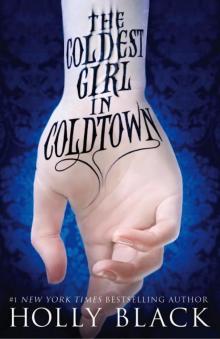 The Coldest Girl in Coldtown
The Coldest Girl in Coldtown The Darkest Part of the Forest
The Darkest Part of the Forest Tithe
Tithe White Cat
White Cat Red Glove
Red Glove The Cruel Prince
The Cruel Prince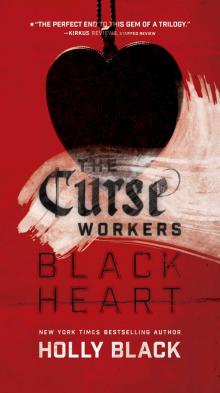 Black Heart
Black Heart Doll Bones
Doll Bones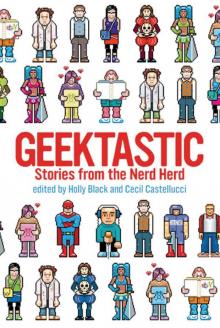 Geektastic: Stories from the Nerd Herd
Geektastic: Stories from the Nerd Herd Zombies Vs. Unicorns
Zombies Vs. Unicorns How the King of Elfhame Learned to Hate Stories
How the King of Elfhame Learned to Hate Stories The Poison Eaters and Other Stories
The Poison Eaters and Other Stories Ironside
Ironside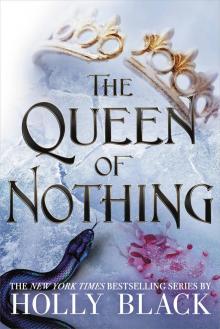 The Queen of Nothing
The Queen of Nothing Modern Faerie Tales
Modern Faerie Tales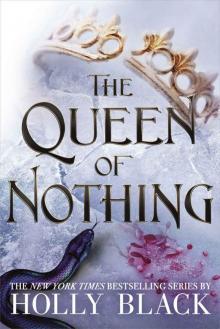 The Queen of Nothing (The Folk of the Air #3)
The Queen of Nothing (The Folk of the Air #3) The Modern Faerie Tales
The Modern Faerie Tales Heart of the Moors
Heart of the Moors The Golden Tower
The Golden Tower Tithe mtof-1
Tithe mtof-1 Ironside mtof-3
Ironside mtof-3 The Wrath of Mulgarath
The Wrath of Mulgarath Lucinda's Secret
Lucinda's Secret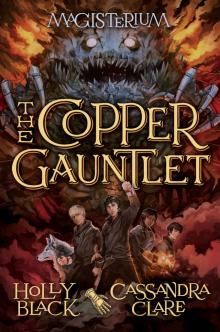 The Copper Gauntlet
The Copper Gauntlet The Field Guide
The Field Guide Valiant mtof-2
Valiant mtof-2 The Lost Sisters
The Lost Sisters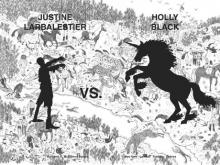 Zombies vs. Unicorns
Zombies vs. Unicorns Bad Seeds: Evil Progeny
Bad Seeds: Evil Progeny Red Glove (2)
Red Glove (2) Notebook for Fantastical Observations
Notebook for Fantastical Observations The Iron Trial
The Iron Trial Welcome to Bordertown
Welcome to Bordertown